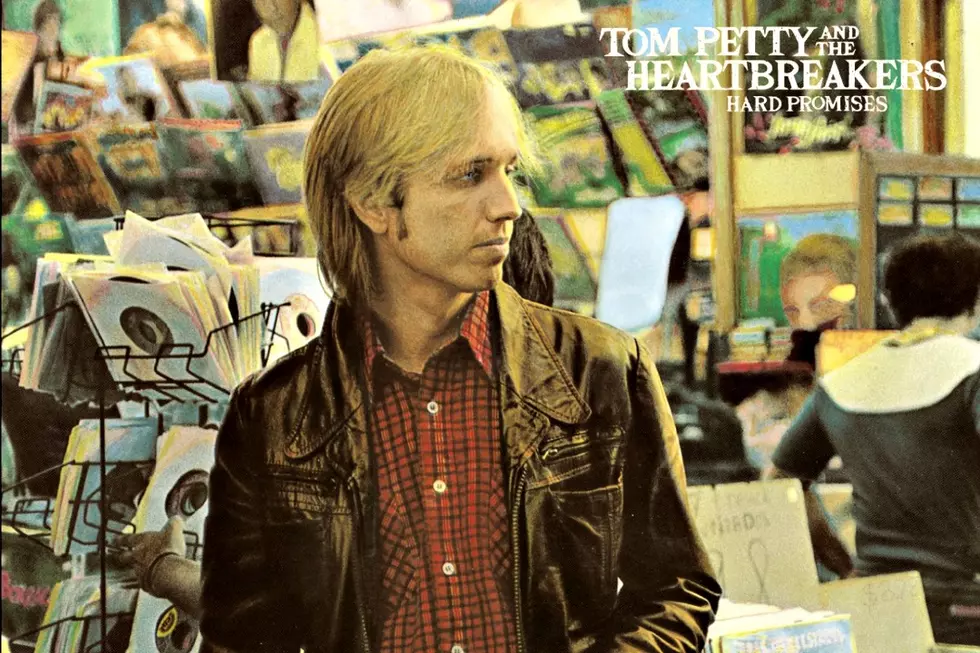
Why Tom Petty and the Heartbreakers Faced Another Battle on ‘Hard Promises’
Tom Petty and the Heartbreakers went through a grueling battle for the fate of their career while recording their third album, Damn the Torpedoes — and they faced yet another fight while working on the follow-up, 1981's Hard Promises.
For a guy whose best songs achieved brilliance with a few simple chords, Petty's business life had grown increasingly complicated while he and the Heartbreakers shot to fame. After slugging it out in court for the right to declare themselves free agents in the wake of their label's sale to MCA — and declaring bankruptcy in the bargain — they scored a lucrative deal with their onetime opponent, landing on a newly established MCA imprint for Damn the Torpedoes.
Yet Torpedoes' subsequent success helped cause another problem for the band — namely, that MCA tabbed the follow-up for part of an experiment in "superstar pricing" that would have seen Hard Promises arriving in stores with a $9.98 price tag, a full dollar more than the established cost for less in-demand acts. For Petty, who joked that he'd been prepared to sell peanuts for a living rather than accept the original terms of his contract's absorption by MCA, the inflated price point was yet another line in the sand.
"A lot of fans have been with us for a long time and I think they trust us," Petty told The New York Times regarding the subsequent standoff. "MCA has done a great job selling our records, but they couldn't see the reality of what it's like on the street — they couldn't see that raising the album's price wouldn't be fair."
Insisting he didn't see MCA as "the enemy," Petty told the Times that his biggest problem with the price increase was that he'd originally been led to believe Hard Promises would sell for the traditional $8.98. "I'm not usually as concerned with record company business as you might think; I like to devote my time and energy to being a musician," he added. "But sometimes there's a communications breakdown and, when that happens, you just have to stand up for yourself."
After threatening to withhold the record (or title it Eight Ninety Eight), Petty scored another victory against MCA, earning the right to sell his music for less than "superstar pricing." Although the industry would still eventually fulfill Petty's prophecies regarding the end result of steady, insidious price increases, when Hard Promises arrived on May 5, 1981, it looked like a victory for regular rock fans everywhere — and it sounded like yet another musical evolution for Petty and the Heartbreakers.
"I'll tell you something, no matter what anybody ever tells you, life is never sweeter than when you have a hit record. I mean, it is a sweet goddamn feeling. It felt great, especially after [the lawsuit]. It was really the only time in my life I felt like justice was done," Petty told Musician. "And that's why, this record I just wanted to up the quality. I think we can always up the quality; I don't understand rock groups that go down, that get worse. I really don't understand. There is no reason for that, if you just keep aware of what's going on."
Watch the Video for Tom Petty and the Heartbreakers' 'The Waiting'
For Petty, keeping aware meant digging deeper for Hard Promises' songs — striking closer to the heart of who he was as a songwriter while exploring a wider sonic and thematic palette. "With our public image, I've always felt – and it's our fault in a way – I've always felt that we looked a little dumber than we are, to the public," he explained. "With this record, I felt, we've gone through so much and seen so much, and there's so much to this, we can't play dumb and make another record of teenage love songs. It was just like playing dumb to me."
One notable change was the introduction of Stevie Nicks into Petty's creative circle. Nicks, who'd been working with Petty producer Jimmy Iovine on her debut solo album, Bella Donna, developed a close working relationship with Petty and the Heartbreakers that spilled over into Hard Promises as well as her own record. "Insider," a song Petty initially wrote with Nicks in mind, ended up on Hard Promises after Nicks tried singing harmony to Petty's guide vocal and realized he wouldn't want to give up the track — so instead, Petty gave Nicks "Stop Draggin' My Heart Around," a Bella Donna duet between the two that later became a Top 5 hit.
That casual song swap is an indication of just how much material Petty and the Heartbreakers were sitting on during the Hard Promises sessions, as well as the fluidity of their still-emerging sound. The band's willingness to diverge from the successful template established with their first few records initially gave Iovine pause, something Petty later suggested caused a small amount of tension early in the sessions, but by the end, the producer was wholly on board.
"That album changed me," Iovine told Warren Zanes in an interview for Petty: The Biography. "I thought ‘The Waiting’ was bigger than ‘Refugee.’ So when it wasn’t a hit, a real hit, it killed me. It was devastating. I felt it was as good as anything I’d ever been near. That song, I thought that was big. That’s why ‘Stop Dragging My Heart Around’ wasn’t important. Because we had ‘Woman in Love’ and ‘The Waiting.’"
As Iovine noted, "The Waiting" — the first single from Hard Promises — wasn't as big a hit as previous Petty efforts, peaking at a mere No. 19 while arguably being overshadowed by "Stop Draggin' My Heart Around." But having competing hits is a nice problem to have, even if one of them has to come out on the losing end — and ultimately, Hard Promises was another platinum LP for Petty and the Heartbreakers anyway, peaking at No. 5 and further cementing their status as a consistently bankable act.
Still, as fast as Petty and the Heartbreakers found an audience with their first few records, they just as quickly learned enough about the record business to know it could all turn around in an instant. The band entered 1981 as multi-platinum rock stars with years of even more massive success ahead of them, but in a very real way, Petty was still a blue-collar Florida kid at heart. "If you're in this business, if you're looking for security, there are a lot of other things I would advise," he told Melody Maker. "I'd always kinda accepted that I would have to do without a great deal of security to do this. I'm living day to day – probably always will."
Legends Who Never Had a No. 1 Single
The Importance of Tom Petty’s ‘Wildflowers’
More From Ultimate Classic Rock









